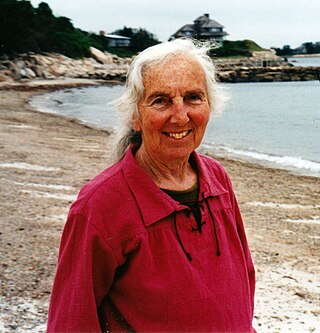Biological determinism, also known as genetic determinism, is the belief that human behaviour is directly controlled by an individual's genes or some component of their physiology, generally at the expense of the role of the environment, whether in embryonic development or in learning. Genetic reductionism is a similar concept, but it is distinct from genetic determinism in that the former refers to the level of understanding, while the latter refers to the supposedly causal role of genes. Biological determinism has been associated with movements in science and society including eugenics, scientific racism, and the debates around the heritability of IQ, the basis of sexual orientation, and sociobiology.

Genetic testing, also known as DNA testing, is used to identify changes in DNA sequence or chromosome structure. Genetic testing can also include measuring the results of genetic changes, such as RNA analysis as an output of gene expression, or through biochemical analysis to measure specific protein output. In a medical setting, genetic testing can be used to diagnose or rule out suspected genetic disorders, predict risks for specific conditions, or gain information that can be used to customize medical treatments based on an individual's genetic makeup. Genetic testing can also be used to determine biological relatives, such as a child's biological parentage through DNA paternity testing, or be used to broadly predict an individual's ancestry. Genetic testing of plants and animals can be used for similar reasons as in humans, to gain information used for selective breeding, or for efforts to boost genetic diversity in endangered populations.

Molecular genetics is a sub-field of biology that addresses how differences in the structures or expression of DNA molecules manifests as variation among organisms. Molecular genetics often applies an "investigative approach" to determine the structure and/or function of genes in an organism's genome using genetic screens. The field of study is based on the merging of several sub-fields in biology: classical Mendelian inheritance, cellular biology, molecular biology, biochemistry, and biotechnology. Researchers search for mutations in a gene or induce mutations in a gene to link a gene sequence to a specific phenotype. Molecular genetics is a powerful methodology for linking mutations to genetic conditions that may aid the search for treatments/cures for various genetics diseases.
Medical privacy, or health privacy, is the practice of maintaining the security and confidentiality of patient records. It involves both the conversational discretion of health care providers and the security of medical records. The terms can also refer to the physical privacy of patients from other patients and providers while in a medical facility, and to modesty in medical settings. Modern concerns include the degree of disclosure to insurance companies, employers, and other third parties. The advent of electronic medical records (EMR) and patient care management systems (PCMS) have raised new concerns about privacy, balanced with efforts to reduce duplication of services and medical errors.

George Wald was an American scientist who studied pigments in the retina. He won a share of the 1967 Nobel Prize in Physiology or Medicine with Haldan Keffer Hartline and Ragnar Granit.
Genetic discrimination occurs when people treat others differently because they have or are perceived to have a gene mutation(s) that causes or increases the risk of an inherited disorder. It may also refer to any and all discrimination based on the genotype of a person rather than their individual merits, including that related to race, although the latter would be more appropriately included under racial discrimination. Some legal scholars have argued for a more precise and broader definition of genetic discrimination: "Genetic discrimination should be defined as when an individual is subjected to negative treatment, not as a result of the individual's physical manifestation of disease or disability, but solely because of the individual's genetic composition." Genetic Discrimination is considered to have its foundations in genetic determinism and genetic essentialism, and is based on the concept of genism, i.e. distinctive human characteristics and capacities are determined by genes.

This article is about the beliefs and theology of the Nation of Islam.
Dorothy Wolfers Nelkin was an American sociologist of science most noted for her work researching and chronicling interplay between science, technology and the general public. Her work often highlighted the ramifications of unchecked scientific advances and potential threats to privacy and civil liberties. She was the author or co-author of 26 books, including Selling Science: How the Press Covers Science and Technology, The Molecular Gaze: Art in the Genetic Age, and Body Bazaar: The Market for Human Tissue in the Biotechnology Age.
Predictive medicine is a field of medicine that entails predicting the probability of disease and instituting preventive measures in order to either prevent the disease altogether or significantly decrease its impact upon the patient.

Ruth Hubbard was a professor of biology at Harvard University, where she was the first woman to hold a tenured professorship position in biology.

The Genetic Information Nondiscrimination Act of 2008, is an Act of Congress in the United States designed to prohibit some types of genetic discrimination. The act bars the use of genetic information in health insurance and employment: it prohibits group health plans and health insurers from denying coverage to a healthy individual or charging that person higher premiums based solely on a genetic predisposition to developing a disease in the future, and it bars employers from using individuals' genetic information when making hiring, firing, job placement, or promotion decisions. Senator Ted Kennedy called it the "first major new civil rights bill of the new century." The Act contains amendments to the Employee Retirement Income Security Act of 1974 and the Internal Revenue Code of 1986.

Plant genetics is the study of genes, genetic variation, and heredity specifically in plants. It is generally considered a field of biology and botany, but intersects frequently with many other life sciences and is strongly linked with the study of information systems. Plant genetics is similar in many ways to animal genetics but differs in a few key areas.
Paul Billings is an American doctor, lecturer, researcher, professor, and consultant on genetic information. His major research interests include the impact of genomic information and biotechnology on society, the integration of genomics and diagnostics in to health and medical care and individualized genomic medicine. Dr. Paul Billings is the author of more than 250 publications and books on genomic medicine, has spoken at numerous medical conferences, and appeared on talk shows such as The Oprah Show and 60 Minutes. He is currently the chief medical officer of Natera, chairman of Biological Dynamics, Inc. and Plumcare LLC, and CEO of Synergenz Bioscience, Inc.

Elijah Wald is an American folk blues guitarist and music historian. He is a 2002 Grammy Award winner for his liner notes to The Arhoolie Records 40th Anniversary Box: The Journey of Chris Strachwitz.

In bioethics and law, gene theft or DNA theft is the act of acquiring the genetic material of another individual, usually from public places, without his or her permission. The DNA may be harvested from a wide variety of common objects such as discarded cigarettes, used coffee cups, and hairbrushes. In addition, a variety of people can be interested on collecting someone’s genetic material. This includes the police, political parties, historians, professional sports teams, personal enemies, etc. DNA contains adequate amount of information about someone and it can be used for many purposes such as establishing paternity, proving genealogical connections or even unmasking private medical conditions.
Genetic ablation occurs when a gene is deemed “null” through the homologous genetic recombination of a gene. It is utilized in the selective suppression of a specific cell line or cell type. This genetic engineering technique does not limit growth suppression to just the activity of an individual gene. Specific cell ablation enables the examination of the in vivo activity of cells. An example of this method in action can be seen through the production of a knockout mouse. This is accomplished through the administration of one or more transgenes into a fertilized mouse oocyte’s pronucleus. Afterwards, it is reimplanted into a host mother, who then births a transgenic mouse. The transgenic mouse carries one copy of the transgene3 out of several hundred. From these mice, a homozygous colony can be created through breeding.
Biotechnology risk is a form of existential risk that could come from biological sources, such as genetically engineered biological agents. The origin of such a high-consequence pathogen could be a deliberate release, an accidental release, or a naturally occurring event.
Genetic privacy involves the concept of personal privacy concerning the storing, repurposing, provision to third parties, and displaying of information pertaining to one's genetic information. This concept also encompasses privacy regarding the ability to identify specific individuals by their genetic sequence, and the potential to gain information on specific characteristics about that person via portions of their genetic information, such as their propensity for specific diseases or their immediate or distant ancestry.

The Myth of Race: The Troubling Persistence of an Unscientific Idea is a book by anthropologist Robert Wald Sussman detailing how race is not, and never had been, a valid biological category in humans. It was published in 2014 by Harvard University Press.
A Dangerous Idea: Eugenics, Genetics and the American Dream is a 2016 documentary film about genetics, eugenics, and social inequality in the United States. The film was directed by Stephanie Welch and distributed exclusively by Bullfrog Films.









